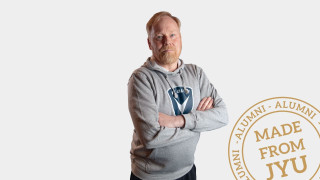JYU alumni Judith Yabal: Building inclusive nursing education through intercultural communication

Judith was raised in Nigeria before moving to Finland at the age of 13, a transition that came with significant challenges. Despite having a Finnish mother, she was never fully perceived as “Finnish”. The harsh climate, unfamiliar culture, and language added to the difficulty of finding a sense of belonging.
Judith pursued a bachelor's degree in nursing at the Jyväskylä University of Applied Sciences (JAMK), where she noticed the struggles of international nursing students, which fueled her determination to understand and overcome these issues. She furthered her education with a master's degree in Intercultural Communication, currently known as Language Globalization and Intercultural Communication (LAGIC), at the University of Jyväskylä in 2016, an academic path that continues to inform her work as a nursing lecturer at JAMK and researcher at the University of Oulu.
Finding solutions to challenges faced by international students
Due to limited access to specialized wards, most international nursing students end up in elderly care, restricting their practical experience and professional growth. Lack of Finnish language skills is often the reason for this issue, yet studies show that language and medical terminology are best learned in the field.
On top of the unequal access to medical practice, international students face other difficulties during their stay in Finland. Financial constraints are a huge concern since living expenses are exceptionally high and they are liable to pay tuition fees. Moreover, adapting to a new culture is an additional challenge, as they must integrate into Finnish society all while overcoming feelings of isolation in an unknown environment.
Having personally experienced the challenges of nursing education and integration, Judith understands the struggles international students face. She is actively working to foster an understanding of diversity among students, educators, and institutions, advocating for greater inclusion of international students in clinical training.
Additionally, the number of foreign patients is growing, further emphasizing the need for intercultural practices. By doing so, the knowledge she gained from her master's studies at the University of Jyväskylä has been beneficial in her efforts.
“The Intercultural Communications course taught by Marko Siitonen helped me understand how communication and cultural awareness can directly influence patient care and team dynamics in healthcare settings. We approached the cultural concept from different angles, and I am passing on that awareness to my students,” Judith reflects.
Cultural Nursing course helps to recognize patients' background
Nursing students are going through an in-depth and complex curriculum, making it challenging to incorporate intercultural theories and concepts into their education. Despite this, JAMK continues to offer a subject called Cultural Nursing, which introduces students to key intercultural topics relevant to healthcare.
As Judith explains, the course aims to promote cultural safety by encouraging both Finnish and international students to recognize that every patient’s background is unique, shaped by life experiences, values and culture. It emphasizes the importance of setting aside stereotypes and biases; to truly listen to patients and provide better care. Additionally, the course creates a space for Finnish and international students to engage and learn from each other’s cultural perspectives.
As a lecturer of Cultural Nursing, Judith has applied the theories and concepts from her master's studies. This knowledge has shaped her teaching, broadening students' perspectives on effective communication in diverse nursing environments. However, Judith recognizes that individual efforts alone are insufficient for systemic change. She believes that collaboration among educators, institutions, and other organizations is essential in creating a more inclusive, culturally competent healthcare system.
Advancing healthcare by bridging the research gap
Judith’s master’s degree at JYU opened her eyes to intercultural practices and made her realize that the challenges faced by immigrant nurses in Finland had not been widely researched. Understanding that research plays a crucial role in driving policy changes and institutional improvements, she decided to focus her academic work on this overlooked topic. She chose to do her master’s thesis on this, despite the lack of resources. Currently, she is researching the psychological safety of culturally and linguistically diverse nurses for her PhD at the University of Oulu.
By applying intercultural communication theories in both teaching and research, she continues to drive meaningful change in Finland’s healthcare system. Judith encourages fellow students to be brave in their academic journey, especially when choosing their research topics. She believes that meaningful change starts with asking difficult questions and challenging existing norms.
Never back down from exploring critical issues, since stepping into unexplored research areas can contribute valuable insights that drive progress in their respective fields.
Judith’s academic journey at the University of Jyväskylä laid the foundation for her approach as both an educator and a researcher. By applying these theories to her teaching at JAMK and her ongoing research at the University of Oulu, she continues to advocate for greater cultural competence in Finnish healthcare. Her experience at JYU inspired her to become a force for change, helping future nurses learn how to care for a diverse range of patients with empathy, respect, and cultural understanding.







